Conference ”Towards EU Accession Negotiations: Priorities of European Integration”
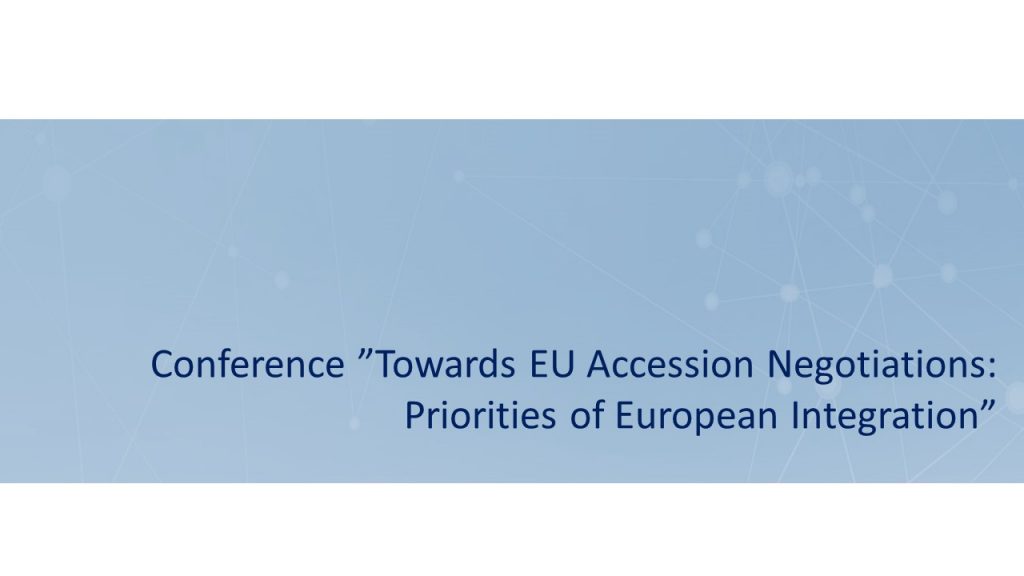
On November 4, 2021, the project “Support to the EU Integration Process of Albania ” (SEI) held the Conference ” Towards EU Accession Negotiations: Priorities of European Integration”. This Conference brought together representatives of institutions, civil society, and integration experts to discuss integration priorities and harmonization of laws according to EU directives.
A special panel at the conference was dedicated to the role of civil society in the European Integration process. Speaker on this panel, Ms. Ariola Agolli, Manager of the Resource Centre at Partners Albania, focused on the issues that have accompanied so far the involvement of civil society organizations in this process, as well as the need to increase the role and contribution of CSOs in it.
Consultation meeting with civil society organizations on the new draft law on public procurement
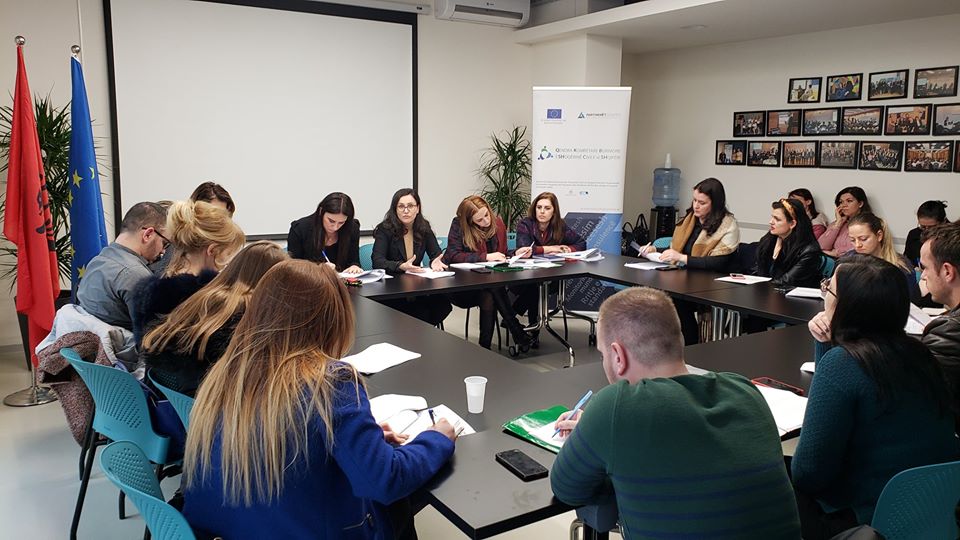
Partners Albania and National Resource Centre for Civil Society in collaboration with the Public Procurement Agency (PPA) on February 2020 held a consultation meeting with civil society organizations on the new draft law on public procurement.
Ms. Reida Kashta, Director of PPA, presented some key issues of the law, particularly regarding procurement of social services but not only, as well as the involvement of CSOs in public procurement. CSO representatives presented their considerations and recommendations on the draft, and considering the high importance that it has, expressed their willingness to be involved in the next steps and contribute to the drafting of bylaws. CSOs play a very important role in the provision of social services in the country.
Partners Albania for Change and Development for years, as part of its work for the enabling environment for civil society has been contributing and advocating for the improvement of the legal framework and the development of social procurement practices.
The consultation for the Draft Law on Public Procurement is still open!
You may submit your comments and recommendations at projektligj@app.gov.al
Consultation meeting with CSOs on “Manual of public participation in the decision-making process of the Assembly”
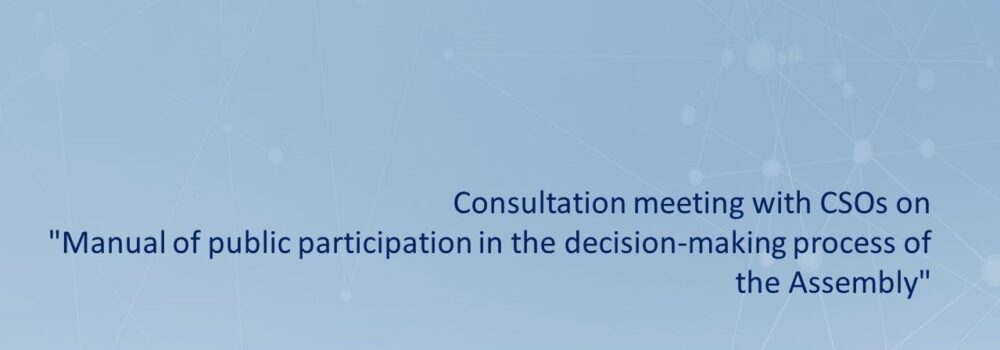
Following the commitment to facilitate the consultation process with the sector, after the announcement for public consultation of the “Manual of public participation in the decision-making process of the Assembly” by the Assembly of the Republic of Albania, National Resource Centre for Civil Society and the Institute for Democracy and Mediation (IDM) organized a consultation meeting with CSOs.
The online meeting took place in early February, with the participation of about 30 representatives of NPOs who discussed the manual and addressed issues or shortcomings in the document. As part of the meeting, CSOs shared their opinions and experiences of recent years on their participation in decision-making processes in the Assembly.
For more on some of the issues identified and CSO recommendations on addressing them, find HERE a summary of the discussions.
Consultation meeting with the Agency for Civil Society Support (ASCS) on the Roadmap 2019-2023
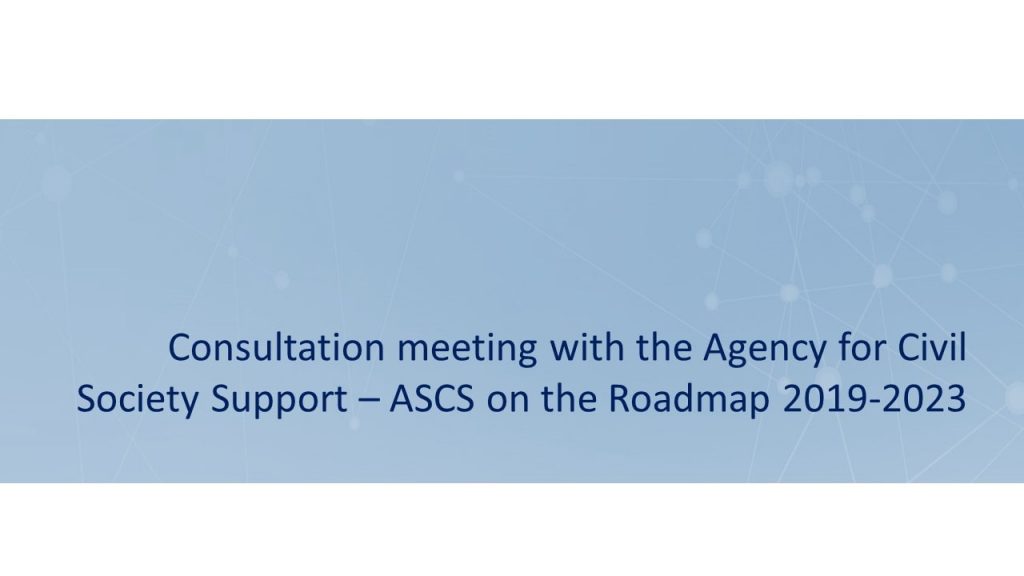
- Berat, dated 09.06.2021, at 12:00, Grand White City Hotel
- Pogradec, dated 10.06.2021, at 12:00, Hotel Pogradeci
Consultation meetings with CSOs on the establishment of the Visitor Center at the Albanian Assembly
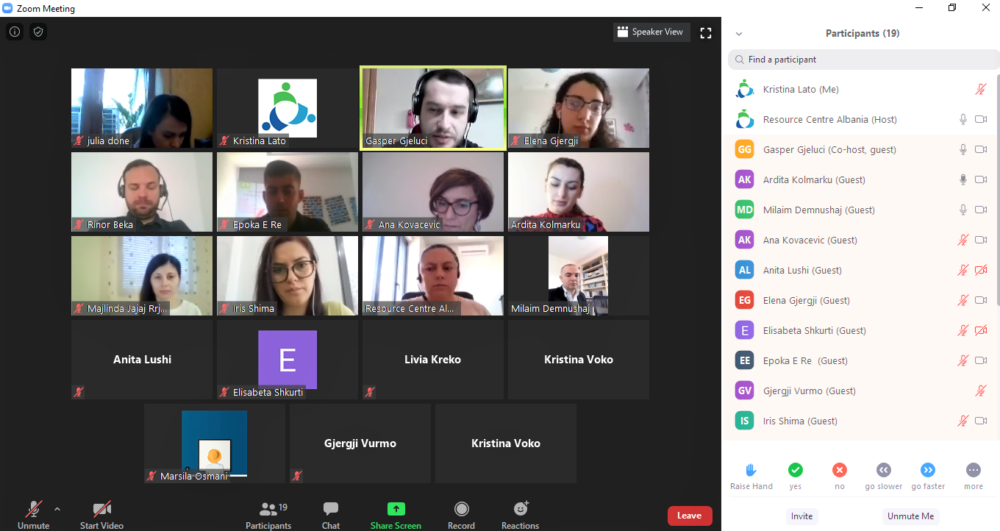
In the framework of the establishment of the Visitor Center at the Albanian Assembly, NDI Albania – National Democratic Institute in cooperation with the National Resource Centre, held several focus groups and consultative meetings during May 2020.
25 civil society organizations operating in the field of human rights, disability, youth and education, discussed in these meetings about the establishment of the Visitor Center, its functions and activities, in response to the interests of the public.
Previously, the Centre has cooperated with NDI also for the wide distribution in the sector of a survey questionnaire regarding the establishment of the centre and its functions. Its main findings were presented during meetings with representatives of civil society organizations and some active networks in the country.
Consultation with civil society organisations – On the priority areas of the 2022 Calls for proposals
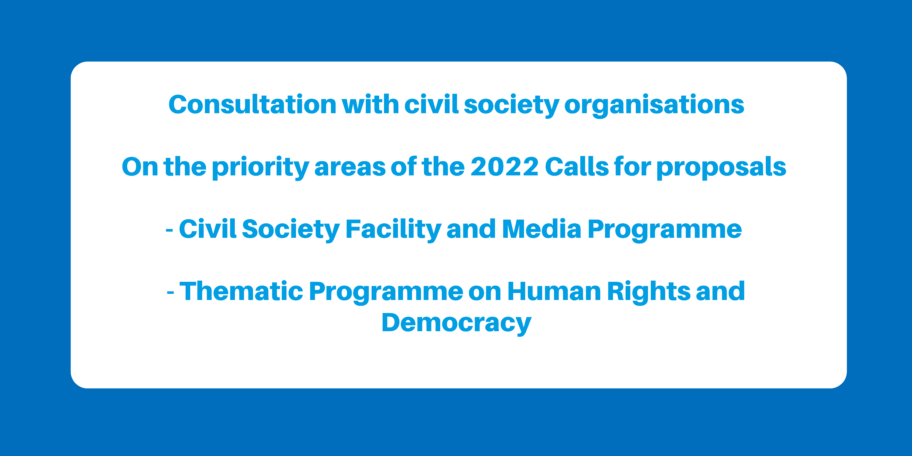
Consultation with civil society organisations on the priority areas of the 2022 Calls for proposals
– Civil Society Facility and Media Programme
– Thematic Programme on Human Rights and Democracy
The Delegation of the European Union to Albania invite civil society organisations to a consultation on the priority areas of its 2022 calls for proposals organised under the Civil Society Facility and Media Programme and the Thematic Programme on Human Rights and Democracy (successor of the European Instrument for Democracy and Human Rights (EIDHR)).
Based on the respective field of expertise, the Delegation would highly value the views of the organisations in the following priority areas (as per agenda below):
AGENDA
Wednesday, 16 February 2022
-9:00-10:00 Anti-corruption / good governance
-10:00-11:00 Media/digital technology
-11:30-12:30 Elections
-12:30-14:00 Environment
Due to the Covid pandemic, this consultation will be held online format only.
If you would like to participate, please send your confirmation by 15 February 2022 and indicate which session(s) you wish to attend: Aida.KOLLCINAKU@eeas.europa.eu
The link to the online meeting: https://eeas.webex.com/eeas/j.php?MTID=mab15a3f800187c354f9b7cbe3f4a448f
Coordination meeting between TACSO 3 and National Resource Centres for Civil Society Development in Western Balkans and Turkey
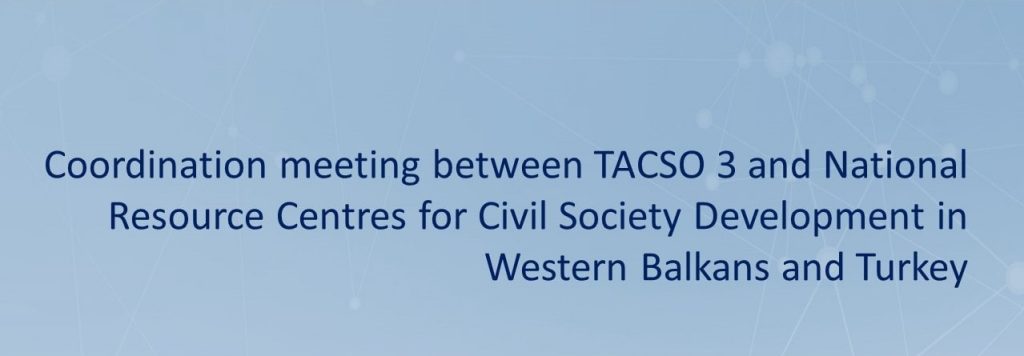
[vc_row][vc_column][vc_column_text]
In April, the third coordination meeting was organized between the National Resource Centres in the Western Balkans and Turkey, representatives of DG NEAR and EU Delegations.
The purpose of the meeting was the exchange of information and coordination of work between the TACSO 3 Program and the National Civil Society Resource Centres in the Western Balkans and Turkey, both programs supported by the European Union.
The meeting was attended by 25 representatives of CSOs serving as Resource Centres for civil society in these countries, representatives of EU Delegations, senior representatives from DG NEAR and the TACSO 3 team.
Presentation of activities and initiatives undertaken by the Centres for capacity building of CSOs, needs for new knowledge and exchange of regional and international experience as well as activities for further promotion of the EU Guide to Civil Society Support, were among key issues discussed throughout the meeting.
Read more[/vc_column_text][/vc_column][/vc_row][vc_row][vc_column][vc_images_carousel images=”5255,5253″ img_size=”full” autoplay=”yes”][/vc_column][/vc_row]
CSO Forum “Accountable CSOs for Effective Development Cooperation”
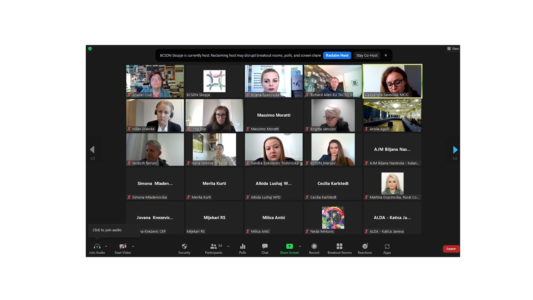
From 3-7 October, CIVICUS’s group of national network organisations (AGNA), celebrated Global Accountability Week 2022. Participants worldwide through online activities learned and lead discussions on “unpacking” and diving deep into the concept of “dynamic accountability”, and exploring opportunities for building more robust civic space. On the last day of the GAW 2022, BCSDN organized a regional workshop on “Donors & CSOs: together towards a more Accountable Civil Society in the Western Balkans”.
The event was followed by more than 30 CSOs practitioners from the Balkans who, together with the donor representatives shared the success and the challenges of the CSOs accountability practices, the new power dynamics in CSO-donor relations, as well as the applicability of the national civil society codes in CSOs’ work. The event also reflected on the Global Standard for CSO accountability recognition on regional and global levels, manifested through its reference in the OECD DAC Recommendation on Enabling Civil Society in Development Co-operation and Humanitarian Assistance and the new DG NEAR Guidelines for EU Support to Civil Society in the Enlargement Region 2021-2027. The regional workshop was also part of a followed-up session of the NRC Partners Albania event on the findings of the OJF Self-Assessment on effective development cooperation based on Istanbul principles and CSOs’ challenges in their implementation, followed by more than 50 participants. The event was moderated by Ms. Biljana Spasovska, BCSDN’s Executive Director who pointed to the relevance of continuous donors- CSOs conversations in building more accountable civil society in the region and welcomed event’s main speakers and participants to jointly contribute to the topic.
Ms. Anabel Cruz, the Founder Director of the Communication and Development Institute (ICD) from Uruguay, discussed the Global Standard and the aspect of dynamic accountability, specifically the relationship between donors and grantees, and CSOs role in enforcing dialogue with the people they work with. Ms. Cruz further reflected that in the OECD DAC recommendation, the Global Standard is recognized as a well-implemented tool to promote accountability, shift the power, and promote dialogue and mutual accountability.
The event continued with focusing on the latest developments in civil society accountability in our region. Ms. Aleksandra Savevska, Project Officer at the Macedonian Center for International Cooperation (MCIC), provided an overview of the recent developments of the self-assessment mechanisms and the institutionalization of the Civil Society Code in North Macedonia. She particularly stressed that the Code is the way national CSOs understand accountability, analyze their strengths and weaknesses, and is the guiding behavior that CSOs intend to change. Similarly, discussing the history and participatory process of preparing and delivering the Code of Standards for Albanian CSOs, Ms. Ariola Agoli, National Resource Centre Manager at Partners Albania for Change and Development, covered specific issues regarding creating and delivering the Albanian Code of Standards. Concerning the question of EU Guidelines in the function of national civil society codes, Ms. Savevska and Ms. Agoli recognized that the in the Guidelines, the EU addresses the issue of the internal work of the CSOs and their compliance with specific standards of accountability and transparency. They also pointed out that MCIC and PA, as national organizations leading the creation and institutionalization of the Codes, are going in the right direction aligning the Codes with various initiatives worldwide.
The event’s final session invited prominent CSOs donors from the region to discuss their role in creating a more accountable and effective Western Balkans civil society. Ms. Hillen Francke, the Head of Sector at Civil society and human capital development, at EU DG NEAR, recognized the pivotal civil society role in participatory democracy and, more widely, in the effective development in the Balkans. She addressed the recent success and challenges of how the EU supports CSOs in the Western Balkans and how the EU CS Guidelines could promote and strengthen the civil society capacity in our region. In addition, Ms. Birgitta Jansson, Senior Programme Manager/ Specialist Democracy and Human Rights Department for Europe and Latinamerica at Sida, by discussing on latest Sida’s strategy and support to civil society in empowering rights holders and holding duty bearers accountable, pointed to the Sida role in promoting the civic space and civil society accountability in the Western Balkans. She recognized the GS recognition in the new EU Guidelines and the OECD DAC Recommendation. Mr. Richard Allen, the EU TACSO 3 Team leader, pointed to the overall EU TACSO support of the Western Balkans civic space and civil society accountability efforts. With regard to the EU Guidelines and EU TACSO’s role in the process, Ms. Allen specified that EU TACSO 3 efforts to measure the extent to which civil society will operate in a more enabling environment, the level of dialogue between CSOs and governments in producing better policy, and the advancement of CSOs’ capacities. He also stressed the interconnectivity of all documents mentioned above: the national civil society codes, the OECD DAC Recommendation, and the EU Guidelines, and the way of their speaking in one voice but in different directions.
The event concluded with participants’ discussion and once again highlighted the role of the national civil society codes as an enabling mechanism that promote participatory democracy, which also help the EU Guidelines to encourage CSOs in the region to invest in their internal accountability practices and enhance their capacities.
CSO Sustainability Index 2020
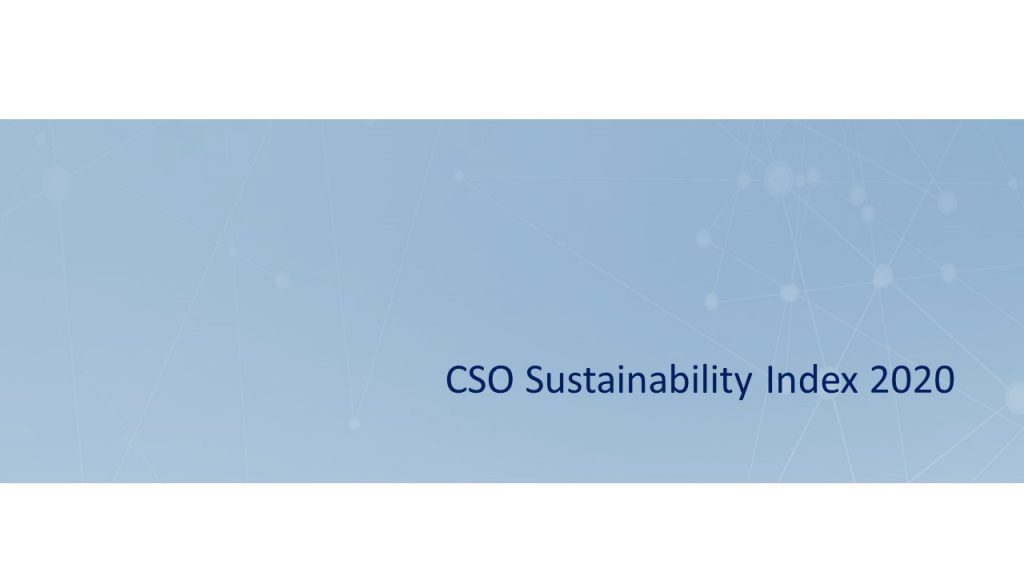
In December, IDM presented the findings of the USAID CSO Sustainability Index (CSOSI) 2020 for Albania.
The main findings for Albania show that the overall sustainability of the civil society sector did not change during 2020. Meanwhile, the financial viability of CSOs is estimated to deteriorate, due to a regression in both the levels and the types of funding available to CSOs.
The report states that despite facing a number of constraints as a result of the COVID-19 crisis, CSOs met the growing demand for services resulting in improvement of service delivery. The year report again, recognizes the contribution of the National Resource Centre as an important infrastructure in increasing the CSOs capacity and the development of the sector in the country. Read more
EU ACCESSION NEGOTIATION PROCESS

Another People to People regional meeting was held in Tirana by Tasco 3, on March 30-31, 2023 with the theme “EU membership negotiation process: Exchange of experience between CSOs from Montenegro and Serbia with CSOs from Albania and North Macedonia”.
The meeting served as an opportunity for representatives from civil society organisations and institutions in 4 countries of the Western Balkans (Albania, North Macedonia, Montenegro, Serbia) to exchange knowledge and good practices on the engagement of civil society in the negotiation process. for EU membership.
Albania and North Macedonia have already started the negotiation process, while Montenegro and Serbia have been following this process for several years. During the meeting, representatives from NPOs and institutions from Serbia and Montenegro shared in dedicated panels their experiences on the progress of the process, State-NO cooperation
platforms and the problems encountered. The meeting also served as a networking event, for establishing cooperation between CSOs and institutions from the participating countries and other exchanges in the future on issues related to European integration and the inherent involvement of civil society in this process.
The event was greeted by Mrs. Lenka Vitkova, Head of the Governance and Human Rights Section at the EU Delegation in Albania and Mrs. Oriana Arapi, Director of the Department of Policies and European Integration in the Prime Minister. The speakers emphasized the importance of the moment, especially for Albania and North Macedonia, which have just started the negotiation process, and the role and contribution that civil society must play in every step of this process.
Ms. Ariola Agolli, Program Director, Partners Albania and Manager of the National Resource Center for Civil Society in Albania, part of the opening panel of the event focused on the structures and mechanisms of cooperation established in Albania as well as the need for more transparency from the institutions. and increasing their efficiency. She emphasized once again the role of Partners Albania in the development of the enabling environment for civil society as well as in strengthening the capacities of NGOs in a number of directions, including European integration and the role of NPOs in the process, as part of the service program of the Resource Center.

